Welcome to the forefront of conversational AI as we explore the fascinating world of AI chatbots in our dedicated blog series. Discover the latest advancements, applications, and strategies that propel the evolution of chatbot technology. From enhancing customer interactions to streamlining business processes, these articles delve into the innovative ways artificial intelligence is shaping the landscape of automated conversational agents. Whether you’re a business owner, developer, or simply intrigued by the future of interactive technology, join us on this journey to unravel the transformative power and endless possibilities of AI chatbots.
We believe in change driven by technology and innovation.
Meet the brains behind our smooth running and powerful machine.
Join our team of experts to make a difference in the real world.
Learn about Appinventiv’s product lifecycle development process.
Our software development services are built to evolve your business idea into a successful growth story
that deploy customized solutions in a wide range of industries
to steadfast success for top globally leading brands
A leading digital platform to offer engaging shopping experience to users
A transforming ERP Solution for the world’s largest furniture retailer
A mobile app to digitalize
& expand KFC’s digital
footprint
A refined UX strategy for Domino’s to increase their conversion rate by 23%
The MIT Innovation award-winning app with $52 Million funding reshaping the employment landscape
A SaaS-based financial literacy and smart money management platform for kids
We believe in change driven by technology and innovation.
Join our team of experts to make a difference in the real world.
Learn about Appinventiv’s product lifecycle development process.
Meet the brains behind our smooth running and powerful machine.
that deploy customized solutions in a wide range of industries
Our software development services are built to evolve your business idea into a successful growth story
A leading digital platform to offer engaging shopping experience to users
A transforming ERP Solution for the world’s largest furniture retailer
A mobile app to digitalize & expand KFC’s digital footprint
A refined UX strategy for Domino’s to increase their conversion rate by 23%
The MIT Innovation award-winning app with $52 Million funding reshaping the employment landscape
A SaaS-based financial literacy and smart money management platform for kids
to steadfast success for top globally leading brands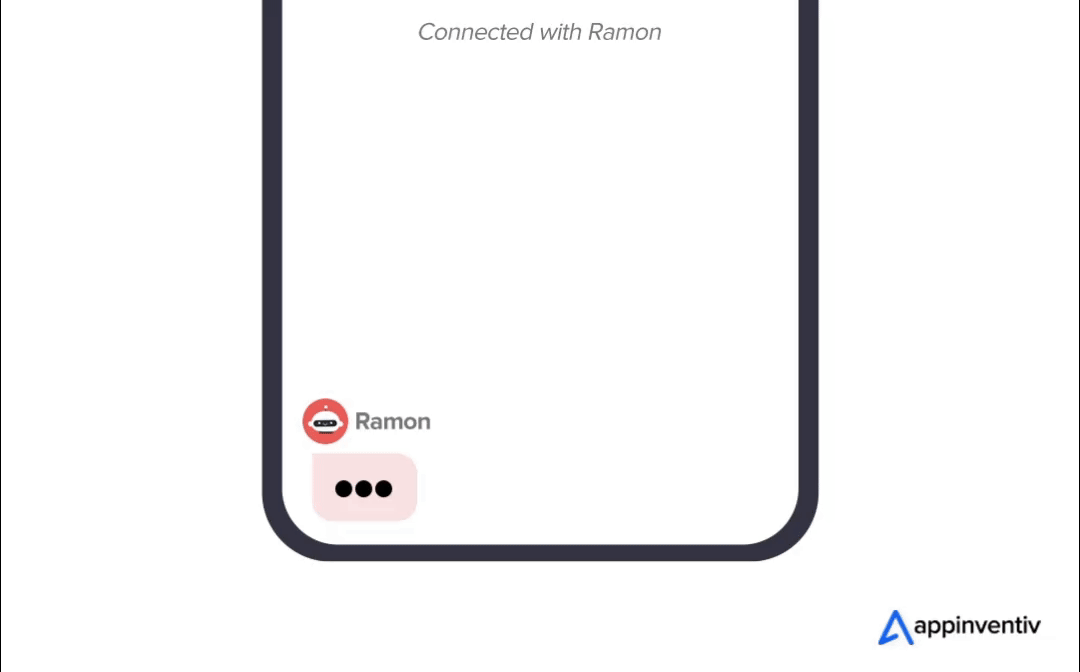
This is not a conversation with a human doctor but an AI-powered healthcare chatbot.
In an era where accessibility and efficiency are critical, AI chatbots for healthcare are revolutionizing patient care by providing instant medical guidance, automating administrative tasks, and streamlining healthcare services. An AI chatbot in healthcare is reshaping the industry from assisting in symptom checking to scheduling appointments and managing insurance claims.
Leading healthcare giants are leveraging medical AI chatbots to enhance patient engagement, reduce workloads, and ensure better outcomes. Over 70% of healthcare organizations across the globe are either pursuing or have already implemented generative AI capabilities like conversational healthcare bots. (Source: McKinsey)
By automating medical representatives’ routine and lower-level responsibilities, chatbots in the healthcare industry are extremely time-saving for professionals. That’s not it, though. They gather and store patient data, ensure its encryption, enable patient monitoring, offer various informative support, and guarantee larger-scale medical help.
This is evident in the growth of the healthcare chatbot market, which is expected to reach a valuation of $10.26 billion by 2034. This market will see a huge boom in the upcoming years due to the increasing adoption of AI-driven virtual assistants, rising demand for remote patient engagement, and the growing need for cost-effective healthcare solutions. (Source: Precedence Research)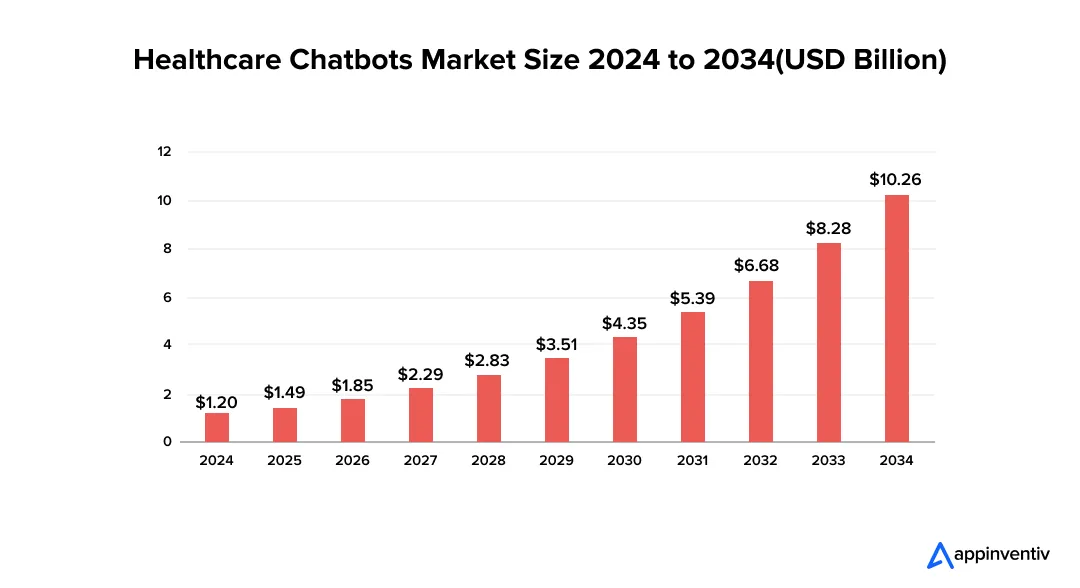
Additionally, the surge in telemedicine services, expanding digital health initiatives, and the push for operational efficiency in healthcare facilities further propel the market’s growth.
As more healthcare businesses recognize the transformative benefits of AI chatbots in healthcare for automating systems, their adoption continues to rise. In this blog, we will explore how medical AI chatbots are revolutionizing the industry through the top 10 use cases, the challenges of implementation, and cost estimations. But before diving in, let’s first understand the key benefits and impact of chatbots in healthcare. Let’s get started!
The use of chatbots for healthcare has proven to be a boon for the industry in many ways. Here are a few advantages of healthcare chatbots that are worth counting.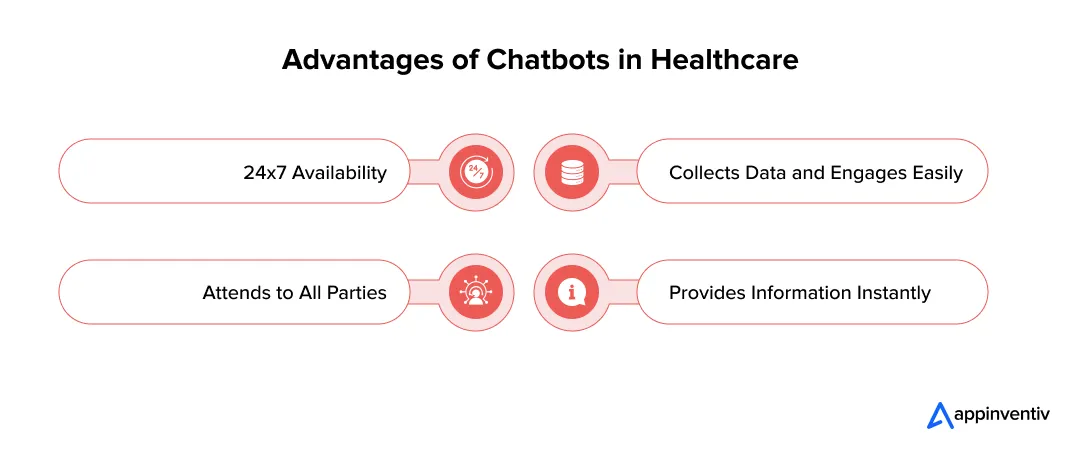
Not everything may always be attended to by medical personnel. Emergencies can happen at any time and need instant assistance in the medical field. Patients may need assistance with anything from recognizing symptoms to organizing operations at any time. Here is where medical chatbots can be useful. They are constantly accessible to everyone.
Healthcare involves a lot of empathy. By probing users, medical chatbots gather data that is used to tailor the patient’s overall experience and enhance business processes in the future.
A website might not be able to answer every question on its own, but a chatbot that is easy to use can answer more questions and provide a personal touch.
It is only possible for healthcare professionals to provide one-to-one care. Their range is hence constrained. Contrarily, medical chatbots may assist and engage several clients at once without degrading the level of contact or information given.
Chatbots for healthcare allow patients to communicate with specialists using traditional methods, including phone calls, video calls, messages, and emails. By doing this, engagement is increased, and medical personnel have more time and opportunity to concentrate on patients who need it more.
In the medical field, time is very critical. When every second counts, chatbots in the healthcare industry rapidly deliver useful information. For instance, chatbot technology in healthcare can promptly give the doctor information on the patient’s history, illnesses, allergies, check-ups, and other conditions if the patient runs with an attack.
Now that you understand the advantages of chatbots for healthcare, it’s time to look at the various healthcare chatbot use cases. Here are 10 ways through which medical AI chatbots are transforming the healthcare sector.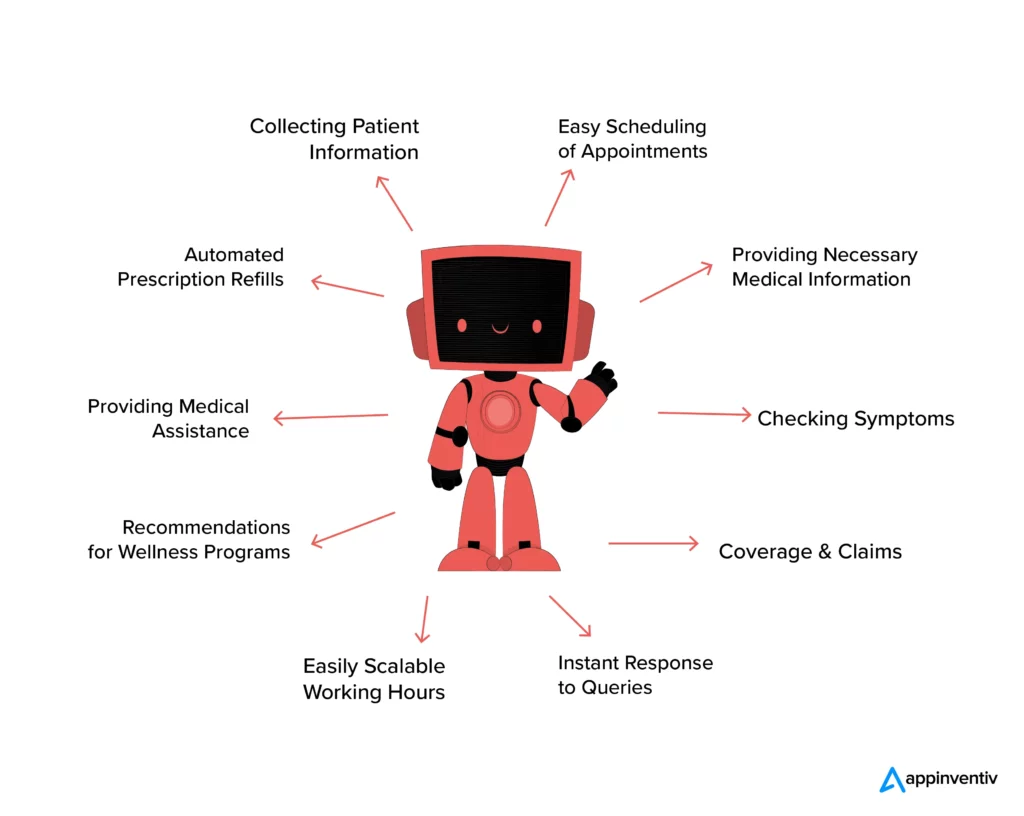
One of the most often performed tasks in the healthcare sector is scheduling appointments. However, many patients find it challenging to use an application for appointment scheduling due to reasons like slow applications, multilevel information requirements, and so on.
When patients come across a long wait period, they often cancel or even change their healthcare provider permanently. The use of chatbots in healthcare has proven to be a fantastic solution to the problem. Visitors to a website or app can quickly access the medical chatbot by using a message interface.
A well-designed medical AI chatbot can plan appointments based on the doctor’s availability. Additionally, chatbots can be programmed to communicate with CRM systems to assist medical staff in keeping track of patient visits and follow-up appointments while keeping the data readily available for future use.
To further speed up the procedure, an AI healthcare chatbot can gather and process co-payments.
Mayo Clinic’s medical AI chatbot streamlines the appointment booking process by matching patients with the right doctors based on availability. The chatbot also helps manage rescheduling and cancellations while integrating with their EHR system. This reduces administrative burden and improves patient experience by cutting down wait times.
Large-scale healthcare data, including disease symptoms, diagnoses, indicators, and potential therapies, are used to train chatbot algorithms. Chatbots for healthcare are regularly trained using public datasets, such as Wisconsin Breast Cancer Diagnosis and COVIDx for COVID-19 diagnosis (WBCD).
As a result of this training, differently intelligent conversational AI chatbots in healthcare may comprehend user questions and respond depending on predefined labels in the training data.
This helps users to save time and hassle of visiting the clinic/doctor as by feeding in little information, one can easily get a nearly-accurate diagnosis with the help of these medical chatbots.
Through its Optum division, UnitedHealth Group utilizes AI-driven virtual assistants to provide personalized medical guidance and symptom analysis. Integrated with Optum’s vast health data network, their chatbot helps users assess symptoms, understand potential conditions, and navigate appropriate care options. It also connects patients with nearby physicians and urgent care facilities, reducing unnecessary ER visits and improving access to timely medical support.
To evaluate a patient’s symptoms and assess their medical condition without having them visit a hospital, chatbots are currently being employed more and more. Developing NLP-based chatbots can help interpret a patient’s requests regardless of the variety of inputs. More accurate responses are crucial when examining the symptoms, and NLP can help accomplish this.
These AI chatbots in healthcare apps can use the information and assist the patients in identifying the illness responsible for their symptoms based on the pre-fetched inputs. The patient can decide what level of therapies and medications are required using an interactive bot and the data it provides.
Buoy Health’s medical AI chatbot uses machine learning to assess symptoms and provide real-time medical guidance. The chatbot interacts with users conversationally and recommends whether they should visit a doctor, rest at home, or seek emergency care. Various healthcare systems have adopted it to improve triage efficiency.
Also Read: How AI Expedites Medical Diagnosis?
You may train healthcare AI chatbots to help patients with their insurance claims. Therefore, a healthcare chatbot can offer patients an easy way to obtain pertinent information, whether they wish to verify their current coverage, file for claims, or track the status of a claim.
Additionally, this makes it convenient for doctors to pre-authorize billing payments and other requests from patients or healthcare authorities because it allows them quick access to patient information and questions.
Cigna leverages AI chatbots to assist members in navigating their health plans, understanding benefits, and managing claims. The chatbot provides real-time support for inquiries related to deductibles, copayments, coverage limits, and claim statuses, minimizing call center dependency. By integrating AI-driven assistance, Cigna improves customer engagement and ensures a seamless insurance experience.
The frequently asked questions area is one of the most prevalent elements of any website.
Simple questions like these are the ones that a chatbot can handle well:
Patients might use chatbots in the healthcare industry to contact a doctor for serious difficulties. A healthcare chatbot can respond instantly to every patient’s general query as a one-stop shop.
Several healthcare service companies are converting FAQs by adding an interactive healthcare chatbot to answer consumers’ general questions. It enables users to find answers to frequent questions quickly.
Cleveland Clinic leverages IBM Watson’s AI chatbot to answer frequently asked patient questions about medical conditions, treatments, and hospital services. The chatbot operates 24/7, assisting users with general health-related inquiries, reducing the burden on customer service representatives.
The gathering of patient information is one of the main applications of healthcare chatbots. By using healthcare chatbots, simple inquiries like the patient’s name, address, phone number, symptoms, current doctor, and insurance information can be utilized to gather information.
Further data storage makes it simpler to admit patients, track their symptoms, communicate with them directly as patients, and maintain medical records.
GYANT’s AI chatbot collects patient data such as medical history, symptoms, and demographic details before an in-person or telehealth consultation. Integrating with hospital CRM systems ensures that doctors have relevant patient information ahead of time. This reduces consultation time and enhances diagnostic accuracy.
Automating medication refills is one of the best applications for chatbots in the healthcare industry. Due to the overwhelming amount of paperwork in most doctors’ offices, many patients have to wait for weeks before filling their prescriptions, squandering valuable time. Instead, the chatbot can check with each pharmacy to see if the prescription has been filled and then send a notification when it is ready for pickup or delivery.
This enables doctors to concentrate on their patients rather than performing menial tasks like calling pharmacies and waiting for a callback. In order to avoid missing any doses or being confused about what to take when they visit the doctor again, it also helps patients stay informed about their forthcoming medical appointments and medication schedules.
CVS Pharmacy integrates an AI chatbot within its app to allow patients to request prescription refills and check medication availability. The chatbot also sends automated reminders for medication adherence, helping reduce missed doses and improving patient outcomes, especially for chronic disease management.
Integration of AI chatbots in healthcare apps helps in giving cognitive behavioral therapy (CBT) to patients with depression, PTSD, and anxiety. They may even teach autistic patients how to become more social and how to succeed in job interviews. Chatbots allow users to communicate with them via text, microphones, and cameras.
One of the prominent healthcare chatbot examples can be seen in Woebot, which is one of the most effective chatbots in the mental health industry, offering CBT, mindfulness, and dialectical behavior therapy (DBT).
Woebot is an AI-driven chatbot offering cognitive behavioral therapy (CBT) to help users manage stress, anxiety, and depression. It engages in real-time conversations, providing coping mechanisms and emotional support. Many mental health providers use Woebot as a supplementary therapy tool for patients needing continuous support.
Also Read: The Impact of AI in Mental Health
Increasing enrollment is one of the main components of the healthcare business. Medical chatbots are the greatest choice for healthcare organizations to boost awareness and increase enrollment for various programs.
With sentiment analysis, a well-designed healthcare chatbot with natural language processing (NLP) can comprehend user intent. The bot can suggest suitable healthcare plans based on how it interprets human input.
Babylon Health’s AI chatbot assesses user inputs such as lifestyle, medical history, and symptoms to recommend personalized wellness programs. It helps users adopt healthier habits by suggesting fitness routines, diet plans, and chronic disease prevention strategies. Healthcare organizations integrate Babylon’s chatbot to promote preventive care.
Any firm, particularly those in the healthcare sector, can first demand the ability to scale the assistance.
How would you manage the rush hour with the same support system in place when traffic unexpectedly increases?
Challenges like hiring more medical professionals and holding training sessions will be the outcome. You may address the issues and provide the scalability to handle real-time discussions by integrating a healthcare chatbot into your customer support.
Healthcare customer service chatbots can increase corporate productivity without adding any additional costs or staff.
Sensely’s virtual AI-powered assistant, “Molly,” provides 24/7 healthcare support for patients. It offers symptom assessments, triage recommendations, and appointment scheduling while integrating with medical databases. Many insurers and healthcare providers use Sensely to manage patient inquiries without increasing staffing costs.
The cost of developing an AI chatbot for healthcare industry depends on factors like complexity, system integration, regulatory compliance (HIPAA, GDPR), and AI capabilities. A basic rule-based chatbot, handling predefined queries and simple interactions, typically costs between $30,000 to $100,000.
For an advanced AI-driven chatbot with NLP, machine learning, and EHR integration, the cost ranges from $100,000 to $300,000 or more. These chatbots offer personalized responses, assist with diagnoses, and ensure seamless data exchange, requiring higher investment in AI training, security, and compliance.
Also Read: What Is the Cost to Develop a Chatbot like Google’s AMIE?
Implementing AI chatbots in healthcare has several challenges, ranging from regulatory compliance to patient trust. Here’s a breakdown of the key challenges and potential solutions: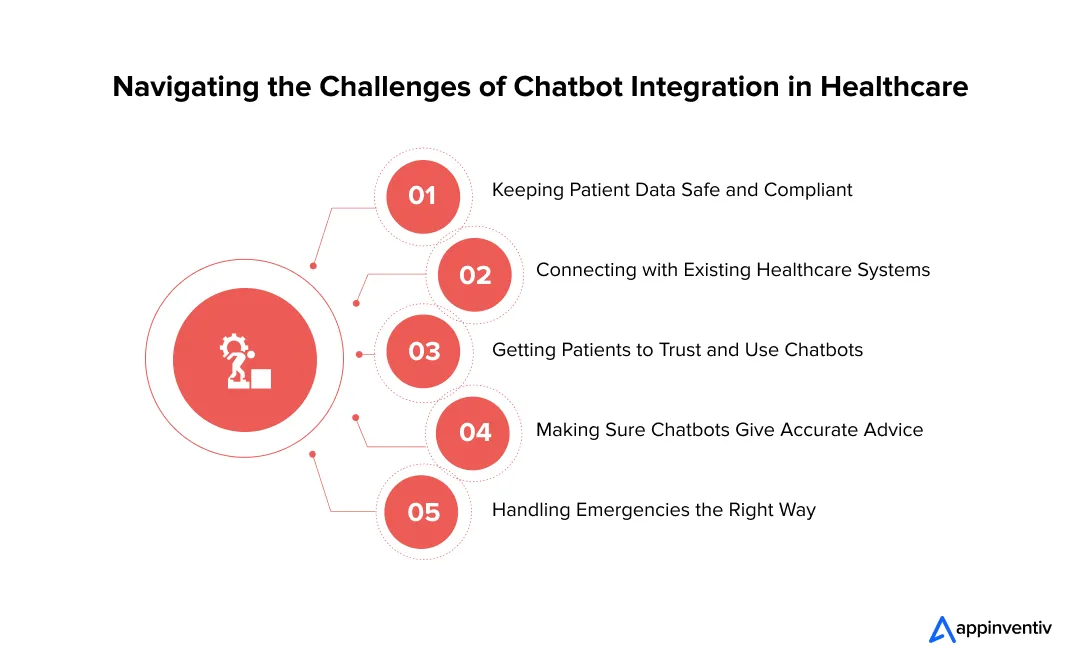
Chatbots handle sensitive medical information, making them a target for cyber threats. Plus, they must comply with strict healthcare regulations like HIPAA, GDPR, and HITECH to ensure patient privacy. A security breach could mean hefty fines and loss of trust.
Ensure end-to-end encryption for all conversations, store data on secure, compliant servers, and use role-based access to restrict unauthorized users. Regular security audits and penetration testing help identify vulnerabilities before they become issues.
Most hospitals and clinics use different Electronic Health Record (EHR) systems, making chatbot integration tricky. If medical chatbots can’t access patient records, it can’t provide personalized responses or update medical histories.
Use FHIR and HL7 standards to ensure the chatbot works smoothly with various EHR platforms. Developing API-based connections allows medical AI chatbots to pull and update patient records while keeping everything secure and compliant. Collaborating with EHR vendors can also streamline the integration process.
Many people hesitate to use AI chatbots for healthcare advice due to fears of misdiagnosis, data misuse, or a lack of human empathy. If they don’t trust the chatbot, they won’t use it.
Be transparent about handling and protecting patient data. Offer a human support option when chatbot assistance isn’t enough. Sharing success stories and testimonials can also help patients feel more confident using the medical bot.
Chatbot technology in healthcare might misunderstand symptoms and give incorrect advice, which could mislead patients and lead to serious health risks. Unlike doctors, they lack clinical intuition and struggle with ambiguous or incomplete patient inputs.
Train medical chatbots on trusted medical datasets like Med-PaLM or Med-BERT, and use AI models that understand medical terminology. A human-in-the-loop system can escalate complex cases to real doctors. Also, medical AI chatbots should clarify that they offer guidance, not diagnoses, encouraging patients to consult professionals when needed.
It’s important to remember that an AI chatbot in healthcare isn’t designed for life-threatening emergencies, and relying on it in a crisis could delay urgent medical care. It must recognize critical situations and escalate to human intervention when necessary.
Include emergency escalation features that direct users to 911 or emergency hotlines when urgent symptoms are detected. Implement voice-assisted options so users can quickly call for help. AI-powered NLP models Can be trained to recognize emergency phrases like “severe chest pain” or “trouble breathing” and trigger alerts for immediate action.
Despite the saturation of the market with a variety of chatbots in healthcare, we might still face resistance to trying out more complex use cases. It’s partially due to the fact that conversational AI in healthcare is still in its early stages and has a long way to go. More sophisticated chatbot medical assistant solutions will appear as technology for natural language comprehension, and artificial intelligence will be better.
Undoubtedly, medical chatbots will become more accurate, but that alone won’t be enough to ensure their successful acceptance in the healthcare industry. As the healthcare industry is a mix of empathy and treatments, a similar balance will have to be created for chatbots to become more successful and accepted in the future.
However, in the upcoming years, it is anticipated that medical bots will live up to the following expectations:
AI chatbots in healthcare are redefining patient engagement, automating administrative workflows, and making medical assistance more accessible. From scheduling appointments to providing real-time symptom analysis, these intelligent solutions enhance efficiency while alleviating the workload on healthcare providers. However, developing a secure, intuitive, and fully compliant chatbot demands specialized expertise.
At Appinventiv, we have successfully delivered cutting-edge healthcare solutions like Health-e-People, Soniphi, and DiabeticU, which are designed to elevate patient care and streamline healthcare operations.
For instance, our experts at Appinventiv built DiabeticU, an innovative diabetes management app designed to help users take control of their health with precision. Equipped with personalized tools and seamless integration with wearable devices, it empowers individuals to monitor their condition effortlessly.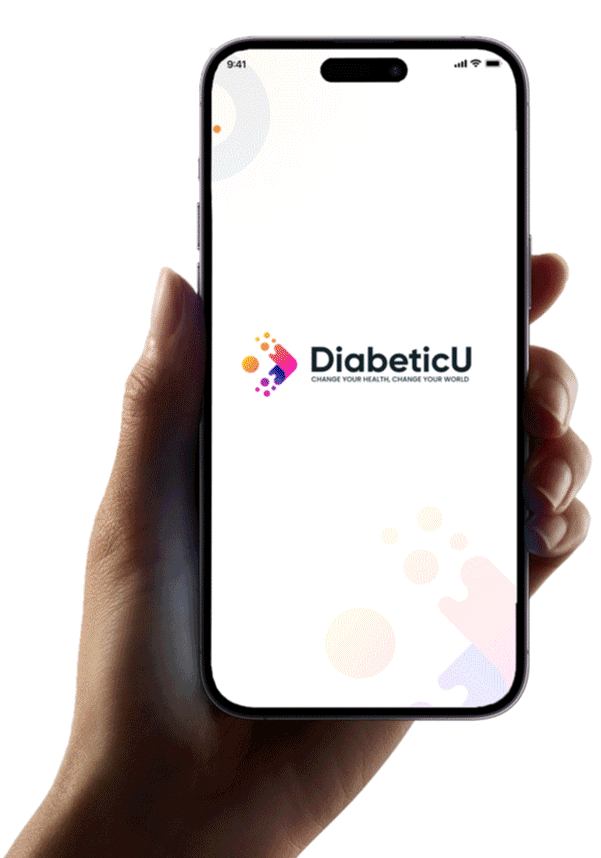 By providing real-time insights and proactive management features, DiabeticU has significantly improved health outcomes for thousands of users, making diabetes care more accessible and effective.
By providing real-time insights and proactive management features, DiabeticU has significantly improved health outcomes for thousands of users, making diabetes care more accessible and effective.
Our deep expertise in HIPAA-compliant app development, AI-powered analytics, and seamless EHR integration ensures our chatbots meet the highest industry standards while providing an exceptional user experience.
As a trusted healthcare app development company, we have a solid track record in healthcare technology. We build intelligent, scalable, and highly secure AI chatbots for healthcare tailored to diverse healthcare needs. Whether you’re a hospital, clinic, or health tech innovator, we empower you to harness the full capabilities of AI chatbots in healthcare and transform patient care.
Let’s revolutionize digital healthcare together!
A. We often have multiple small concerns about our health and well-being, which we do not take to the doctor. It is advantageous to have a healthcare expert in your back pocket to address all of these concerns and questions.
An AI chatbot for healthcare can accomplish all of this and more by utilizing artificial intelligence and machine learning. It can provide information on symptoms and other health-related queries, make suggestions for fixes, and link users with nearby specialists who are qualified in their fields. People with chronic health issues, such as diabetes, asthma, etc., can benefit most from it. Connect with a healthcare IT consulting firm to know more.
A. The following few features of medical bots make them an exceptional technological tool for everyone in the medical field to have:
A. There are many types of chatbots in the healthcare market, listed below are a few of them:
A. Here are some of the vital steps of developing a chatbot for hospitals:
A. Here are some effective ways to address ethical concerns surrounding healthcare AI chatbots:
10 Ways Healthcare Providers Are Using Patient Analytics to Enhance Care Plans and Optimize Outcomes
Imagine a world where doctors don’t just react to health crises, but predict and prevent them before they happen. This is the reality with patient analytics for healthcare providers. The healthcare industry is no longer limited to treating symptoms—it’s now about understanding patterns, making smarter decisions, and delivering care that’s truly personalized. And it’s not…
Exploring the Role of Personalization in Healthcare through Technology
Key takeaways: Personalization in healthcare transforms patient care from generic, population-based treatments to individualized approaches tailored to each patient’s unique needs. Advanced technologies like AI, IoMT, and genomics are the core enablers for tailoring medical treatments. Personalization drives significant benefits, including improved patient outcomes, higher engagement, and reduced costs. The future of healthcare is hyper-individualized,…
Smart Hospitals – How Modern Technology Is Enhancing Healthcare Operations
Key takeaways: Smart hospitals use AI, IoT, and automation to improve patient care, streamline operations, and reduce costs. 75% of healthcare executives view digital and AI transformation as essential, with high satisfaction among those investing in robotics (82%) and advanced analytics (81%). IoT-enabled patient monitoring and AI diagnostics are revolutionizing clinical decision-making and reducing risks…
B-25, Sector 58,
Noida- 201301,
Delhi – NCR, India
79, Madison Ave
Manhattan, NY 10001,
USA
Appinventiv Australia,
East Brisbane
QLD 4169, Australia
3rd Floor, 86-90
Paul Street EC2A 4NE
London, UK
Tiger Al Yarmook Building,
13th floor B-block
Al Nahda St – Sharjah
Suite 3810, Bankers Hall West,
888 – 3rd Street Sw
Calgary Alberta
Full stack mobile (iOS, Android) and web app
design and development agency
Appinventiv is the Registered Name of Appinventiv Technologies Pvt. Ltd., a mobile app development company situated in Noida, U.P. India at the street address – B- 25, Sector 58, Noida, U.P. 201301.
All the personal information that you submit on the website – (Name, Email, Phone and Project Details) will not be sold, shared or rented to others. Our sales team or the team of mobile app developers only use this information to send updates about our company and projects or contact you if requested or find it necessary. You may opt out of receiving our communication by dropping us an email on – info@appinventiv.com
1600+ transformation engineers delivered
3000+ game-changing products.
We chose Appinventiv to build our financial literacy and money management app from start to finish. From the first call, we were very impressed with Appinventiv’s professionalism, expertise, and commitment to delivering top-notch results.
It has been a pleasure working with Appinventiv. The team is not only extremely versatile and competent but also very professional, courteous, and responsive. We certainly plan to continue working with Appinventiv for an indefinite period.
We took a big leap of faith with Appinventiv who helped us translate our vision into reality with the perfectly comprehensive Edamama eCommerce solution. We are counting to get Edamama to launch on time and within budget, while rolling out the next phase of the platform with Appinventiv.
I just want to take a moment to thank the entire Appinventiv team for your incredible support. We truly appreciate everything you’ve done, and we’re excited to continue working together as we grow here at KODA
After researching numerous companies, we finally found Appinventiv, and it was the best decision we could have made. They successfully addressed the challenges with our existing app and provided solutions that exceeded our expectations.
We approached Appinventiv with a clear vision to build a robust and future-ready platform that could seamlessly integrate with the busy lifestyle of our customers while uplifting their overall experience and giving us a competitive edge.
1600+ transformation engineers delivered
3000+ game-changing products.
Connect with our consultation experts to get:
Insights specific to your business needs
Roadmap to overcome your challenges
Opportunities to scale your business in this niche.
